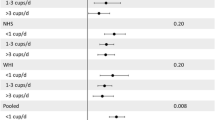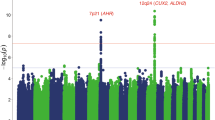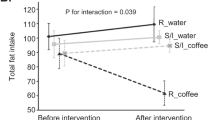Abstract
Objectives
In observational studies, caffeine has been associated with a lower risk of obesity. However, whether the associations are causal and apply to coffee, which is a mixture of chemical compounds is unclear.
Design
Two sample Mendelian randomization study.
Setting and Participants
Genetic instruments predicting caffeine were extracted from an existing GWAS of serum metabolites in 1960 individuals of European descent. For coffee consumption up to 91,462 individuals of European ancestry with top SNPs followed-up in ∼30,062 coffee consumers and up to 375,833 individuals of European ancestry were taken from two separate studies. Genetic associations with obesity classes (n= 263,407), waist-to-hip ratio (WHR) (n=210,086), waist circumference (WC) (n= 231,355), and hip circumference (HC) (n=211,117) were obtained from summary statistics of individuals of European ancestry from the Genetic Investigation of Anthropocentric Traits (GIANT).
Methods
The inverse-variance weighted method (IVW) was used as the main analysis. We also employed the weighted median approach (WM) and MR-Egger regression as sensitivity analyses. To gauge evidence of directional pleiotropy, we used Cochrane’s Q test, and MR-PRESSO global test, as measures of heterogeneity between ratio estimates of variants.
Results
There was little evidence to support an association between blood caffeine and any anthropometric measure of obesity in the primary and sensitivity analyses. However, genetically predicted coffee consumption was positively associated with higher class I obesity and WHR. Furthermore, this association was maintained after correction for multiple testing (P < 0.05/6 = 0.008). Results from the GWAS of coffee consumption were in tandem with results from the GWMA, but associations with class I obesity and waist to hip ratio (WHR) were not maintained after correction for multiple testing.
Conclusion
We found little evidence that caffeine or coffee consumption protects against obesity, adding to growing literature suggesting that previous observational studies may have been confounded. This study demonstrates the dangers of ignoring genetic testing for targeted interventions and basing dietary policy recommendations solely on observational studies restricted to specific populations.

Similar content being viewed by others
Abbreviations
- GWMA:
-
genome wide meta-analysis
- GWAS:
-
genome wide association study
- MR:
-
mendelian randomization
- IVs:
-
instrument variables
- SNP:
-
single nucleotide polymorphism
- IVW:
-
Inverse weighted median
- WM:
-
weighted median
- ME:
-
MR-Egger
- WHO:
-
World Health Organization
- BMI:
-
Body Mass Index
- WC:
-
waist circumference
- HC:
-
hip circumference
- WHR:
-
waist to hip ratio
- GIANT:
-
Genetic Investigation of Anthropocentric Traits
References
ZHOU A., HYPPONEN E. habitual coffee intake and plasma lipid profile: evidence from uk biobank, clin nutr 2021: 40: 4404–4413. doi:https://doi.org/10.1016/j.clnu.2020.12.042
MUHAMMAD H. F. L., SULISTYONINGRUM D. C., HURIYATI E., LEE Y. Y., MANAN WAN MUDA W. A. the interaction between coffee: caffeine consumption, ucp2 gene variation, and adiposity in adults-a cross-sectional study, j nutr metab 2019: 2019: 9606054. doi:https://doi.org/10.1155/2019/9606054
LEE A., LIM W., KIM S., KHIL H., CHEON E., AN S. et al. coffee intake and obesity: a meta-analysis, nutrients 2019: 11. doi:https://doi.org/10.3390/nu11061274
LARSEN S. C., MIKKELSEN M. L., FREDERIKSEN P., HEITMANN B. L. Habitual coffee consumption and changes in measures of adiposity: a comprehensive study of longitudinal associations, Int J Obes (Lond) 2018: 42: 880–886. doi:https://doi.org/10.1038/ijo.2017.310
NORDESTGAARD A. T., THOMSEN M., NORDESTGAARD B. G. Coffee intake and risk of obesity, metabolic syndrome and type 2 diabetes: a Mendelian randomization study, Int J Epidemiol 2015: 44: 551–565. doi:https://doi.org/10.1093/ije/dyv083
LEE J., KIM H. Y., KIM J. Coffee Consumption and the Risk of Obesity in Korean Women, Nutrients 2017: 9. doi:https://doi.org/10.3390/nu9121340
GREENBERG J. A., AXEN K. V., SCHNOLL R., BOOZER C. N. Coffee, tea and diabetes: the role of weight loss and caffeine, Int J Obes (Lond) 2005: 29: 1121–1129. doi:https://doi.org/10.1038/sj.ijo.0802999
LOPEZ-GARCIA E., VAN DAM R. M., RAJPATHAK S., WILLETT W. C., MANSON J. E., HU F. B. Changes in caffeine intake and long-term weight change in men and women, The American Journal of Clinical Nutrition 2006: 83: 674–680. doi:https://doi.org/10.1093/ajcn.83.3.674
THOMAS D. R., HODGES I. D. Dietary Research on Coffee: Improving Adjustment for Confounding, Curr Dev Nutr 2019: 4: nzz142–nzz142. doi:https://doi.org/10.1093/cdn/nzz142
CENSIN J. C., PETERS S. A. E., BOVIJN J., FERREIRA T., PULIT S. L., MAGI R. et al. Causal relationships between obesity and the leading causes of death in women and men, PLoS Genet 2019: 15: e1008405. doi:https://doi.org/10.1371/journal.pgen.1008405
WHO. Obesity: preventing and managing the global epidemic. Report of a WHO consultation, World Health Organ Tech Rep Ser 2000: 894: i–xii, 1–253.
FREEDMAN D. S., KHAN L. K., SERDULA M. K., GALUSKA D. A., DIETZ W. H. Trends and Correlates of Class 3 Obesity in the United States From 1990 Through 2000, JAMA 2002: 288: 1758–1761. doi:https://doi.org/10.1001/jama.288.14.1758
ANDREYEVA T., STURM R., RINGEL J. S. Moderate and severe obesity have large differences in health care costs, Obes Res 2004: 12: 1936–1943. doi:https://doi.org/10.1038/oby.2004.243
KITAHARA C. M., FLINT A. J., BERRINGTON DE GONZALEZ A., BERNSTEIN L., BROTZMAN M., MACINNIS R. J. et al. Association between class III obesity (BMI of 40–59 kg/m2) and mortality: a pooled analysis of 20 prospective studies, PLoS Med 2014: 11: e1001673. doi:https://doi.org/10.1371/journal.pmed.1001673
LONG T., HICKS M., YU H. C., BIGGS W. H., KIRKNESS E. F., MENNI C. et al. Whole-genome sequencing identifies common-to-rare variants associated with human blood metabolites, Nat Genet 2017: 49: 568–578. doi:https://doi.org/10.1038/ng.3809
COFFEE, CAFFEINE GENETICS C., CORNELIS M. C., BYRNE E. M., ESKO T., NALLS M. A. et al. Genome-wide meta-analysis identifies six novel loci associated with habitual coffee consumption, Mol Psychiatry 2015: 20: 647–656. doi: https://doi.org/10.1038/mp.2014.107
ZHONG V. W., KUANG A., DANNING R. D., KRAFT P., VAN DAM R. M., CHASMAN D. I. et al. A genome-wide association study of bitter and sweet beverage consumption, Hum Mol Genet 2019: 28: 2449–2457. doi:https://doi.org/10.1093/hmg/ddz061
BURGESS S., THOMPSON S. G. Bias in causal estimates from Mendelian randomization studies with weak instruments, Statistics in Medicine 2011: 30: 1312–1323. doi:https://doi.org/10.1002/sim.4197
BURGESS S., BUTTERWORTH A., THOMPSON S. G. Mendelian randomization analysis with multiple genetic variants using summarized data, Genet Epidemiol 2013: 37: 658–665. doi:https://doi.org/10.1002/gepi.21758
BOWDEN J., DAVEY SMITH G., HAYCOCK P. C., BURGESS S. Consistent Estimation in Mendelian Randomization with Some Invalid Instruments Using a Weighted Median Estimator, Genet Epidemiol 2016: 40: 304–314. doi:https://doi.org/10.1002/gepi.21965
BURGESS S., THOMPSON S. G. Interpreting findings from Mendelian randomization using the MR-Egger method, Eur J Epidemiol 2017: 32: 377–389. doi:https://doi.org/10.1007/s10654-017-0255-x
BOWDEN J., DEL GRECO M. F., MINELLI C., ZHAO Q., LAWLOR D. A., SHEEHAN N. A. et al. Improving the accuracy of two-sample summary-data Mendelian randomization: moving beyond the NOME assumption, Int J Epidemiol 2019: 48: 728–742. doi:https://doi.org/10.1093/ije/dyy258
VERBANCK M., CHEN C. Y., NEALE B., DO R. Detection of widespread horizontal pleiotropy in causal relationships inferred from Mendelian randomization between complex traits and diseases, Nat Genet 2018: 50: 693–698. doi:https://doi.org/10.1038/s41588-018-0099-7
HEMANI G., ZHENG J., ELSWORTH B., WADE K. H., HABERLAND V., BAIRD D. et al. The MR-Base platform supports systematic causal inference across the human phenome, Elife 2018: 7. doi:https://doi.org/10.7554/eLife.34408
PIRASTU N., KOOYMAN M., ROBINO A., VAN DER SPEK A., NAVARINI L., AMIN N. et al. Non-additive genome-wide association scan reveals a new gene associated with habitual coffee consumption, Sci Rep 2016: 6: 31590. doi:https://doi.org/10.1038/srep31590
MCMAHON G., TAYLOR A. E., DAVEY SMITH G., MUNAFO M. R. Phenotype refinement strengthens the association of AHR and CYP1A1 genotype with caffeine consumption, PLoS One 2014: 9: e103448. doi:https://doi.org/10.1371/journal.pone.0103448
ANTY R., MARJOUX S., IANNELLI A., PATOURAUX S., SCHNECK A. S., BONNAFOUS S. et al. Regular coffee but not espresso drinking is protective against fibrosis in a cohort mainly composed of morbidly obese European women with NAFLD undergoing bariatric surgery, J Hepatol 2012: 57: 1090–1096. doi:https://doi.org/10.1016/j.jhep.2012.07.014
KIM H. J., CHO S., JACOBS D. R., JR., PARK K. Instant coffee consumption may be associated with higher risk of metabolic syndrome in Korean adults, Diabetes Res Clin Pract 2014: 106: 145–153. doi:https://doi.org/10.1016/j.diabres.2014.07.007
KWOK M. K., LEUNG G. M., SCHOOLING C. M. Habitual coffee consumption and risk of type 2 diabetes, ischemic heart disease, depression and Alzheimer’s disease: a Mendelian randomization study, Sci Rep 2016: 6: 36500. doi:https://doi.org/10.1038/srep36500
Author information
Authors and Affiliations
Contributions
V.P.N conducted data analysis and drafted the manuscript. V.P.N and S.Y. Y interpreted findings and critically reviewed the manuscript.
Corresponding author
Additional information
Conflict of Interest Statement
The authors declare no conflict of interest.
Electronic Supplementary Maerial
Rights and permissions
About this article
Cite this article
Narayan, V.P., Yoon, S.Y. Associations of Blood Caffeine and Genetically Predicted Coffee Consumption with Anthropometric Measures of Obesity: A Two Sample Mendelian Randomization Study. J Nutr Health Aging 26, 190–196 (2022). https://doi.org/10.1007/s12603-022-1736-5
Received:
Accepted:
Published:
Issue Date:
DOI: https://doi.org/10.1007/s12603-022-1736-5




